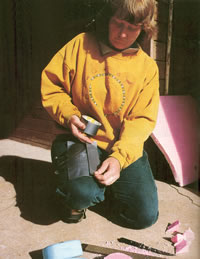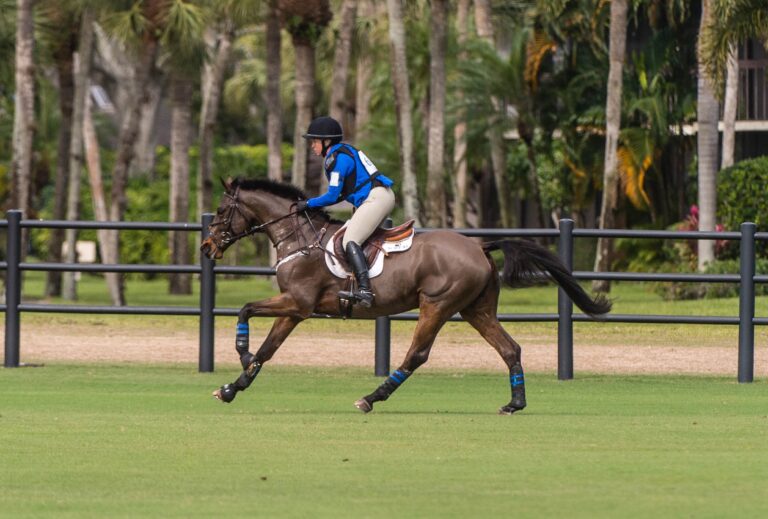There’s a basic disconnect in our industry right now: We’re breeding thousands of quality sport-horses in this country, but at some point all of those nice young horses turn three years old and need to start their under-saddle training.

Many amateurs buy unbroken young horses–often, buying a baby is a way to own a horse of a quality they wouldn’t be able to afford once it’s made–but few of them have the experience to start a youngster under saddle. And (here’s the important missing piece) we have too few trainers in the U.S. who’re interested in taking on young horses.
There are a couple of reasons why this piece is missing:
- Young professionals just getting started think they need to make a name for themselves with upper-level horses in order to get established. (This means they’re competing directly with better-known trainers for the same slice of the pie–the relatively few potential clients who own top horses. Then we hear complaints from newcomers that “you can’t make any money in the horse business.”) At the least, most professionals want to work with horses not younger than four or five, a point in their education where they can be prepared for the ring.
- If a trainer works with young horses, those horses will need to move on to another program once they’re started (if only to make room in the barn for more youngsters coming in). As our system works now, this necessity runs counter to most trainers’ understandable desire to hold on to clients rather than “losing” them to another professional.
As a result of the situation I’ve described, too many nice young horses end up as “problems” in need of remedial training just because they haven’t been started correctly. Unless we do something, the breeding market will become non-existent: If the horse-buying public hears 2000 “disaster” stories about buying young horses for every success story, our business is gone.
Fortunately, initiatives have begun at both the private and the national level to brighten this discouraging prospect. I’ll talk about those, but first let me give my overview of how a system for young horses needs to work: Buyers of unbroken weanlings or yearlings could keep them at home (with good professional input on handling, if they need it) until age two or three, then board them at a center that specializes in training young horses. At this facility, the babies would get affordable basic education and–with basics in place–be ready to move up to a regular trainer.
Here are the features that I think make such a system do-able:
- Reasonable cost: At Hilltop, we have to charge $1200 a month for the small number of young horses we’re able to board and train in addition to the farm’s many other activities. But it can be done much more cheaply at a less elaborate facility. Young horses don’t take a lot of time; they need variety, flexibility and an atmosphere in which they’re the purpose of the place and not just an add-on. Owners would go in knowing what to expect as a total cost, because there would be a set time frame for training–a plan, which could of course be adjusted as needed–for each horse.
- Dedication to the needs of young horses and their owners: Young horses need a type of program totally different from adult horses. When you teach them a bad habit, it’s hard to re-train it, especially when it involves trust. As a trainer you need to see every youngster as an individual and be smart about your own strengths and weaknesses. You have to be able to work in an atmosphere that’s free of the pressure that “It has to be THIS today”–because at the age we’re talking about, a horse can be very different from day to day. If you’re both willing and able to change your training plan today in response to how each young horse is feeling and acting, you’re setting yourself up for a better tomorrow and a much better day one year–or three years–from now.
- Opportunity for young trainers starting out: It makes sense for younger people to be working with young horses, and not just because they bounce more easily if they happen to fall. The young-horse niche is a place where a talented rider can make money, build a reputation, and establish a client base–the owners who are buying the nice babies. It may well be that the young-horse trainer ends up getting (for example) a very nice Third Level horse from one of the owners concerned because “this kid has so much talent and has worked so hard with these young horses.” As the trainer starts to get more made horses to ride, he or she might take fewer young horses–but by then there would be somebody newer, ready to open another young-horse facility. That’s the kind of flow we’ve been totally missing in this country.
- Encourages trainers to specialize and work together: A facility dedicated only to young horses won’t threaten other trainers in the area once they recognize its benefits. If the young-horse trainer does a good job and is willing to hand horses along when they’re ready for a regular program, he or she develops relationships with good trainers in the area. They’re now supporting each other and can respect each other’s roles. When you send an owner who comes to you with a young horse to a specialized facility that will put on correct basics before it comes to your barn, you’re not losing a client, you’re helping a client.
This scenario isn’t just wishful thinking on my part. I know of at least one young-horse program that’s already operating on a trial basis: Judi Gerhardt’s StartSmart Academy at the Blue Moon Equestrian Center (Covington, La.). During four months in the program, young horses are backed, evaluated and started under saddle. Then they’re sent on to their riders and regular trainers.
Judy brought European riders over to get StartSmart going but her goal is to eventually use American trainers, and I totally agree. As programs like hers become established, I don’t think we should be looking to Europe to staff them. It’s legally and practically complicated to import trainers, the good young European riders are very busy in their own countries–where many stables have young-horse programs that offer them jobs–and we have perfectly good trainers in this country, they just need to know how to specialize. In the U.S., we have positive forces for horsemanship such as Pony Club, 4H and junior hunters. They all have great attributes for learning the sport; we just have to utilize them better, to produce the young-horse trainers that we need.
To put more focus on young horses at the national level, the U.S. Dressage Federation’s (USDF) Sport Horse Committee is promoting Materiale Classes at dressage shows and is putting more emphasis on the five- and six-year-old championships. (Hilltop Farm, where I’m head trainer, complements these programs by sponsoring the Futurity classes at Dressage at Devon, where the $10,000 each for the five-and six-year-old divisions exceeds the cash prizes in the Grand Prix!) I taught a segment on young-horse training at the 2004 USDF National Symposium in Lexington, Ky. I hope all of this activity will create a snowball effect that will interest more and more trainers in working with young horses.
Scott Hassler and his wife, Susanne, managed Hilltop Farm in Colora, Md.–a warmblood breeding and training center that now stands an average of 12 stallions throughout the U.S., the Netherlands, Germany and Sweden—for 15 years. In 2005, the farm hosted the first-ever “Young Dressage Horse Trainers Symposium.” Scott chairs the USDF Sport Horse Committee and serves on the U.S. Equestrian Federation (USEF) Breeding Committee. In early 2006, he was named National Young Horse Dressage Coach by the USEF.
This column originally appeared in the July 2004 issue of Practical Horseman magazine. For information about the Young Horse Trainers Symposium held at Hilltop Farm in 2005, see the September 2005 issue.










